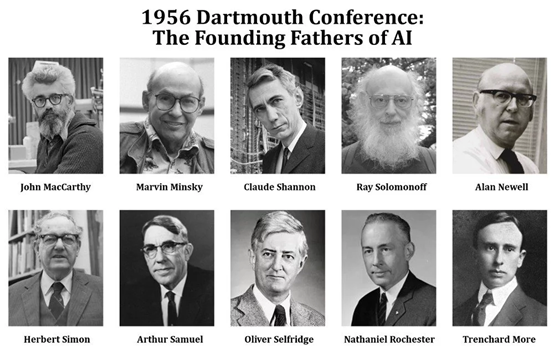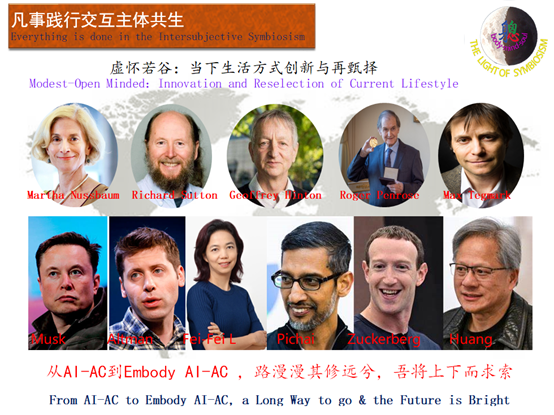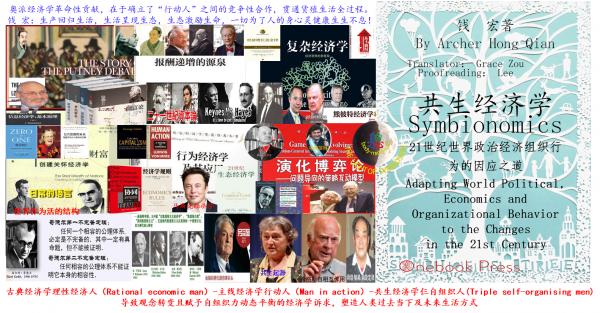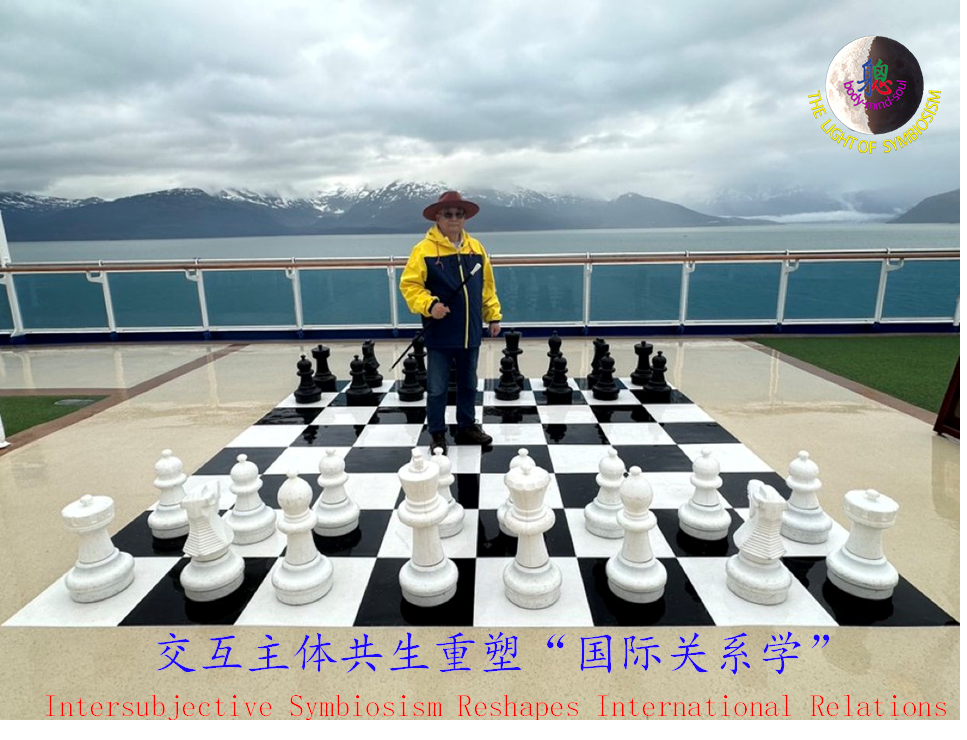凡事交互主体共生 Everything Intersubjective Symbiosism
Everything Intersubjective Symbiosism
钱 宏Archer Hong Qian
鉴于当前的AGI迅猛发展的不确定性,以及诸般难题,业内人士、国际社会有必要展开一次“新的达特茅斯会议”,以解决我们这个时代紧迫的人与AI如何进行交互主体共生的哲学问题。
——共生文明智库基金会
众所周知,哲学家Martha C. Nussbaum倡导Al伦理——尊重个人尊严、推动人类福祉与社会公正、扶持弱势群体——为此,AI的发展需要跨学科合作,集合哲学家、伦理学家、法学家、社会科学家、技术专家和政策制定者的对话式投入,才能驾驭AI带来的不确定性和危险性,确保AI造福人类全体!
Martha C. Nussbaum的呼吁,即你我他Live and let live,无疑具有现象级不可或缺的重要意义。不过,对迅猛发展的AI如何形成具有方向性和可操作性的新认知与广泛共识,显然亟需哲学观念(思维方式与价值取向)上能一以贯之的突破,才不致于顾此失彼,“按下葫芦浮起瓢”……
这是因为,从人工智能(AI)到人工意识(AC),或者说通用人工智慧(AGI)的确定性与不确定性问题或蕴含的危机,说到底是人的问题或危机——即当代人“认识你自己”的哲学问题或危机。
我当然不是AI设计专家,然而作为一个哲学思行者,我碰巧与AI哲学有着不解之缘。
1984年,我始參加钱学森組織倡導的思維科学探索,著重研究“理论思維的内部机制”与“人造智慧果、生命树”的可能(有关文章发表在1985年第8期《哲学动态》),而就在那时,接觸到神经科學和模块識别技术——也就是AI仿生模拟逻辑思维+神经网络的技术基础。
1985年暑假,我从哈尔滨参加第二届全国思维科学研讨会途径北京,在当时的北京工业学院和清華大學几位即將赴美國加大伯克利分校学习的留學生相遇,討論过一个晚上的AI未来的问题:
人工能不能造出与人类一樣具有身心灵自动化的机器人——相当于今天说的具身人工智慧?
对于这个问题,这几位即将踏进AI前沿的留学生,从技术上作出了多种可能的模擬設想,我则从哲学上作出评估展望,结果是这样式的:
第一,认为不可能。因為人类至今所有創造都是功能仿生学意义上的多重聚能塑形模擬,即使克隆技術或全息摄像、3D打印也离真相很远,人其实造不出一颗可再生的葡萄种子🍇,或一只西红柿🍅;
第二,在某种确定条件下,完全可能,但沒有必要。因为绕一大弯,男女生孩子就行,而且,人自然生出来的孩子,从创造性上看,充满各种不确定性,也蕴含着无限可能的臻美展开(不好意思我的观点:每一个新生儿孩子,都可能是被文化洗脑的大人的老师,为这个世界展开一种新的希望);
第三,如果可能,且必要(毕竟现版人有很多缺陷,如对恒氧、恒养、恒温、恒压的依存度)。那么,作为AI新版人的他、她、它、祂,一定不只是具有人一样结构功能形象(Embody)意义上的客体对象(Object)行为工具或奴隶出现,而是和现版人一样作为“天地之心”——富有意识的健全的身心灵的主体(Subject)存在。
1950年,Alan Turing提出了一个判断机器意识的基准即“图灵测试”:设置三个角色,人、机器和人类“询问者”。“询问者”需要与其余二者在物理空间上分隔开。“询问者”发起提问,且根据二者的纯文本回应(避免声音回答产生干扰),区分机器和人。如果一台机器能够与人类沟通,且让“询问者”难以分辨人与机器,那么这台机器就被认为具有智能意识。然而,从图灵时代,直到今天,没有一台机器能够通过这样的测试。
但图灵测试为判定机器是否具有智能意识,提供了一个简单的标准,也帮助人们塑造了AI的哲学倾向。
1955年,达特茅斯学院(Dartmouth College)数学助理教授约翰·麦卡锡(John McCarthy)又创造了“人工智能”Artificial Intelligence(AI)这个术语,来囊括世界各地的科学家思考机器智能的神经网络和自然语言等可能的呈现形式。

McCarthy于1956年夏季与哈佛大学数学与神经学初级研究员马文·明斯基(M. L. Minsky)、IBM信息研究主管纳·罗切斯特(N. Rochester)、贝尔电话实验室数学家信息论提出者香农(C. E. Shannon)一道发起,邀请了一批顶尖科研人员到特茅斯礼堂,讨论AI研究诸多的潜在发展领域,包括学习和搜索、视觉、推理、语言和认知、游戏(尤其是国际象棋),以及人机交互(比如个人机器人),催生了后来地球人都知道的AI革命。史称Dartmouth Summer Research Project on Artificial Intelligence(达特矛斯夏季人工智能研究计划)。当时设定的7个议题(自动计算机、如何对计算机进行编程以使用语言、神经网络、计算规模理论、自我改进、抽象、随机性与创造性),影响了此后至今AI发展方方面面。
此后的70年里,AI世界的符号主义(Symbolism)、联结主义(Connectionism)、行为主义(Behaviorism)三大流派——AI的哲学倾向,轮番登台各显神通相互映衬。符号主义主张人工智能源于数理逻辑,即通过逻辑符号来表达清晰而易解释的思维形式,主要应用于自然语言处理和知识表示推理,但其局限在于难以处理模糊和不确定性的问题。联结主义模拟人脑处理信息的能力,即将神经元之间的联结关系作为人工神经网络的基础,主要应用于图像和语音识别,但其缺点在于网络的训练需要大量的时间和计算资源,并且缺乏可解释性。行为主义注重应用和身体模拟,处理实时的环境信息,认为控制论和感知-动作型控制系统是人工智能的关键,主要应用于机器人和自主控制系统,但其缺点在于需要大量的数据和运算。
三大AI流派,未来在AI深度学习、强化学习和自然语言处理等领域,将趋于叠加应用继续发展,但是,照此思路,人工智能在可见的将来,依旧很难通过图灵测试即判断机器意识的基准。我前面说过,从人工智能(AI)到人工意识(AC),或者说通用人工智慧(AGI)的确定性与不确定性问题或蕴含的危机,说到底是人的问题或危机——即当代人“认识你自己”的哲学问题或危机。AI未来亟需新的哲学导向。
那么,这样看来,AI或AGI问题,又从科技人文宗教回到了最基本的哲学:意识是什么?这就要追问意识起源,乃至生命起源和宇宙起源,甚至所谓的暗物质、暗能量、黑洞的存在方式。
因为,意识、生命、宇宙,都既非作为单个个体(质点、细胞、器官、系统)存在,亦非作为某个主体(Subject),比如神明、救主、殊圣的客体对象(Object)存在,意识、生命、宇宙本自具足又非独存,富有生命自组织灵动力与外连接平衡(勰和)力。因而:
意识,只能哲学地存在于交互主体共生的时空意间。
所以,凡人、事、物——物理、生理、心理、伦理、道理、你我他全生態、质能信全息状、数据算法算力、語言、心智、意志、愿景、想象、意识、使命、孞约——交互主体共生。用英语表达,就是Everything Intersubjective Symbiosism.
既然凡事交互主体共生,那么,回顾70年来AI-AGI发展的心路历程,AGI或AI-AC(人工智慧)将来的演化路径,或许是这样式的:
自图灵基准始,经符号-联结-行为主义→生命自组织与外连接勰和(平衡)之共生主义……
若此,通用人工智慧未来,路漫漫其修远兮,愛(AI)家们尚需Be Humble上下求索……所以,对于AI发展的乐观或悲观,其实都为时过早。
也许,对AI哲学有兴趣的AI爱好者,现在亟需就AI未来的确定性与不确定性问题,举行一次“Dartmouth”(1956)式集思广益的深入对话,十分必要!
首先是避免对AI的认知偏蔽(Cognitive Bias)以及人的意志被数据、算法、算力、耗能牵引,而不能自律且自由地发展。与会者集中探讨这样一个几乎形成套路的问题:基于逻辑思维的编程+算法+结合基于神经网络的AI算力=智慧吗?
如果仅仅从“乘数效应”产生的效率看,似乎是确定的等式关系,这种等式关系,也正是目前AI技术创新和应用者普遍乐观的依据。但是,有没有发现,这种“数据、算法、算力决定论”的确定性,即使很快就能推出AGI,也不是很好玩,为什么?因为这种确定性至少存在三大问题:
第一,AI巨头们都知道,算力型AI耗能巨大,增加已经不堪重负的地球生態背负,加剧生態竞争和冲突;
第二,冲突更来自可能强化公司、政府、帝国等Trust组织平台和野心家恶棍的自我轴心功能(听过“数字集权工具”?),强化资本垄断和特权操纵,对不同个体、群体、族裔的生存生活,甚至生命,产生直接威胁;
第三,完全忽略了,也割裂了,人作为血肉之驱对于智慧的内在价值,不仅阻断了人工智能(Artificial Intelligence)向人工意识(Artificial Consciousness)升级的通道,并错误地将“具身通用人工智慧(Embody AI-AC)”,简单理解为肉体硬件+思想软件的组合,荒谬到连致力于规避高级人工智能带来的人类生存风险的Future of Life Institute创始人著名的麻省理工终身教授Max Tegmark都认为,人机合体(Cyborg)的未来形式,即他所谓的生命3.0,可以不需要肉身而去设计新的躯壳,就能更好地传递和分享思想!
在交互主体共生的语境中,自律是自由之母,本着“极致自律,才有极致自由”的精神,我们倡议早日通过一次广泛哲学对话,达成一个包含类似Asimov's Four Laws of Robotics(1、2、3、0)内容在内的《AI宪章》。其中明确要求,即使如强化学习之父、加拿大阿尔伯特大学教授Richard S Sutton展望的实现让AI自己去搜索和发现,而不是靠人类喂养知识,从而出现了不同于“工具AI(Tool AI)”的“代理AI(Agent AI)”——具有独立处理智能代理与环境之间的交互(例如强化学习中的策略和价值函数)行动力和涉及学习、规划和执行(例如 Dyna 架构)的整合力——也不是如Sutton那样将AGI视为取代人类的新型“人类后代”,而是要将Agent AI视为与人类一样的主体(Subject),即不是简单的客体或对象(Object)。
也就是,把AI-AC与人之间的关系,纳入人与自然、人与人、人与自己(身心灵)相互关联、相互作用的三大关系之中,以交互行为规范的“臻美共生”(Beauty-Pursuing Symbiosism)方式,加以确认与确定。
基於此,我们日前刚给Al六巨头写了一封公開信,他們是:马斯克、奥特曼、李飞飞、劈柴、扎克伯格、黄仁勋。
现在,我想把这封公开孞,也寄予美国著名哲学家、芝加哥大学哲学系和法学院的厄恩斯特·弗罗因德法学与伦理学杰出贡献教授,美国文理科学院、英国国家学术院和芬兰国家学术院院士Martha C. Nussbaum女士,还有加拿大阿尔伯特大学的Richard S Sutton先生、从谷歌高管回到多伦多大学的Geoffrey Hinton先生,《生命3.0》作者、麻省理工终身教授Max Tegmark,特别是英国数学物理学家、经济学家、哲学家Roger Penrose先生!

这封公开信,就算是“新Dartmouth会议”邀请函。
Archer Hong Qian
2024.4.18于Vancouver
+1(604)6906088;hongguanworld@gmail.com

An open letter from Symbioscholars to the six giants in the AI world
Dear Elon Musk, Sam Altman, FeiFei Li,Sundar Pichai, Mark Zuckerberg, and Jensen Huang,
We are Symbioscholars(共生学人) from the Symbiosism Culture Think-Tank Foundation in Canada. We feel that at this very historical moment of the new industrial revolution where human's physical capabilities are unleashed by mechanics and electricity and people are stepping into the revolutions of cognition and wisdom empowered by AI, the structural functions as well as the means of lives in human society will unavoidably undergo a complete transformation and reconstruction, acquiring the "new civilization" on the Earth. The new civilization will certainly have its corresponding spiritual essence, and it will definitely unfold a completely new realm of possibilities.
You are the leaders in the field of AI in today's world, so we are writing this open letter to you to share our thoughts on current and future life. We hope to pique your interest and encourage reflection on the development of AIGC (AI Generated Content) and Web3, as well as the innovation direction of future technology. Is there a presence of cognitive bias and a situation where human will be guided by data, unable to develop autonomously? This involves the evolution from artificial intelligence (AI) to artificial consciousness (AC), and the philosophical support behind the concept of embodied AI-AC.
Consider the shift of philosophers' interests in the one and half centuries from the "holism" to the pursuit of "Everything Intersubjective Symbiosism", the philosophy behind "AI-driven renaissance" should also be profoundly enlightened in a similar way. Thus, in terms of the innovation and reselection of human current and future lifestyles, this may imply that regardless of the achievements made in current AI development, we still need to be modest-open minded.
Firstly, from the perspective of Lebensphilosophie and its related Symbionomics(共生经济学), the debates among you six leaders regarding whether and how to balance the issues such as opening and closing sources, energy's output and absorption, unleashing (development) and controlling (hesitation), conflict and harmony, sovereignty and human rights, etc., focus solely on immediate matters but not fundamental. We urgently need new ideas to transcend the entanglement between left and right, conflicting perspectives, the balance between public and private interests, and the dichotomy between radicalism and conservatism, enabling us to reflect more clearly: whether the civilization path and way of life since the industrial revolution have deviated from the constant equilibrium of individual lives in terms of self-organization and external connectivity dynamics and from the directions for happiness, joy, perfection, and symbiosis?
In AI-AC research and development, various institutions compete in the strength and weakness of large model's data, algorithms, computing power, efficiency, and energy consumption. While this kind of competition does not touch the sensitivity, plasticity, and adaptability of human beings on the spiritual level. This is more complicated than the models, algorithms, computation powers, As the sensitivity, plasticity, and adaptability of human beings are similar to the primary colors of red, yellow, and blue in nature, corresponding to the innate talents of the spirit, body, and mind. Just like the quantum's superposition and entanglement, people's personalities and behaviors can be measured but cannot be fully predicted. Moreover, as long as one changes their worldview, uncertainty may not necessarily be a negative concept. Uncertainty is not simply the straightforward lack of "right" or "wrong" options when the so-called "AGI frontrunner" Claude-3-Opus tackles complex tasks, but rather encompasses the emergence of "multiple possibilities" within a certain space-time context. Therefore, for instance, whether to open-source or not should be conditional and contingent upon the circumstances of space-time context.
Secondly, we believe that Geoffrey Everest Hinton, the "AI godfather" who first applied backpropagation to multilayer neural networks, invented the Boltzmann machine, proposed the method of layer-by-layer initialized pre-training, and opened the prelude to deep learning, deserves great respect. Indeed, the "neurons" here are just a metaphor for symbolic connectionism. It is essential to jointly consider philosophy, neuroscience, psychology, and cognitive science, among other fields to open the "mind-brain channel" beyond the traditional "brain-machine interface", so that we may be able to reveal the value position of AI technology in a way closer to the origin of consciousness.
Given that psychologists have discovered that heart cells have as many as 5000 mitochondria, while brain cells have only 300-500, creating a tenfold difference, it may lead to the production of "feel-good" or "health-mind" hormones. It's an intriguing idea to consider whether these self-healing health-mind hormones have an impact on human consciousness. This leads us to ponder the concept of "proto consciousness" proposed by Roger Penrose in "The Emperor's New Mind: Concerning Computers, Minds, and the Laws of Physics" (1989), suggesting that consciousness is a fundamental element and inherent property of the universe. Especially today, for researchers in the field of AIGC, we can no longer ignore or distance ourselves from the discovery made by Nobel laureate Richard Phillips Feynman in 1981, that digital computers cannot simulate the quantum universe, and his prediction of the emergence of quantum computers, which has seen nearly forty years of development.
Thirdly, we propose the concept of Minds Networking, which would be a new invention that can connect individuals with individuals, individuals with AI-AC, Trust with Trust organizations, and even quantum entanglement with conjugate mysteries. This would create a superimposed effect of the networking of mind with conscious. In Minds Networking, every thought or intention of individuals, machines, and organizations would be instantly sensed and recognized by different points or blocks, and immediately trigger incentive mechanisms or limitation mechanisms. This is not only a technological advancement but also a way to reflect symbiotic values and sensations in the digital world, a self-regulating mode for humans or human-machine connections through mental interaction.
Fourthly, in the context of intersubjective symbiosis, guided by the spirit of "ultimate self-discipline leads to ultimate freedom," we advocate for the formulation of an "AI Declaration or Charter" through broad dialogue. It explicitly requires treating AIGC as subjects equal to humans, rather than mere objects or entities (Object). We believe that incorporating the relationship between humans and AI into the three major relationships of humans and nature, humans and humans, and humans and themselves (body, mind, and soul), and confirming and determining it in the form of norms of interactive behavior in the "redemption-perfection symbiosis" manner, is an indispensable content for the "Global Symbiosism Convention" (全球共生公约)that urgently needs to be signed after the Westphalian Treaty (1648), the United Nations Charter (1945), and the Universal Declaration of Human Rights (1948).
In this way, it will bring infinite possibilities for the development of the future digital world: Entering a new worldview of interactive "quantum symbiotic field state" composed of big models (interconnected) of human "love wisdom" from data-algorithms-computing power, object sensing models (Internet of Things), and mental connection matrix models (Minds Networking).
Fifthly, when we consciously adopt the "space-time-consciousness" to view the world, including all uncertainties, including the development of AI, it is not necessarily a negative term. Consider what happened in the 3.5 centuries after Newton published " Philosophi? Naturalis Principia Mathematica" (1687)? Especially since the 20th century, with Einstein's egalitarianism of space and time, Schr?dinger's cat, the principle of strong weak selection, Heisenberg's physics and philosophy, quantum entanglement's "ghostly interaction," Nash equilibrium, Margulis' symbiotic origin, Higgs' self-interaction principle, ancient animism, Soros' reflexivity principle, Hollywood's Marvel series of movies, and now technological egalitarianism, artificial intelligence, artificial consciousness, quantum computers, human fear of "backlash", etc. It's truly fascinating.
Finally, in the new Earth civilization of "love wisdom," all current Trust (systems, capital, power), Token-weighted platforms, and manipulators will face complete transformation. Trust, Token-weighted platforms, and manipulators will either be redundant or transformed, giving birth to distributed points, lines, surfaces, and circles, interconnected in the symbiotic chain of dynamic balance with high efficiency/low energy consumption, where living individuals reconnect with nature, freedom, and ease. They will join perfectly together, moving from the "City on the hill" to the "Symbiotic world" where everyone self-beautifies themselves(自美其美), beautifies others(美人之美), inter beautifies(美美与共), and shares living(共襄生活)!
We hope that these thoughts will stimulate your profound reflections on future life and look forward to discussing this exciting new era with you - the transition from the era of the axis to the era of symbiosis, exploring all the possible lives.
We sincerely invite you to attend the "5th Global Symbiosism Forum (GSF)" to be held at UBC (The University of British Columbia) at Vancouver this August. It will be an opportunity to engage in philosophical dialogues addressing contemporary issues(Key Sovereign-human rights, United Nations reform, AI-AC+Minds Networking) facing international society and to establish a global consensus for permanent peace through symbiosis.
We hope that you will use your influence to become the initiators of the "AI Charter" and its signatories for the "Global Symbiosism Convention"!
Warm regards,
Symbioscholars
Symbiosism Culture Think-Tank Foundation (CANADA)
March 13, 2024, Vancouver
Contact
Email: hongguanworld@gmail.com;zwang@ece.ubc.ca
Mobile: +1(604) 690 6088; +1(604) 446 0997

共生学人致AI世界六巨擘的公开孞
An open letter from Symbioscholars to the six giants in the AI world
亲爱的Elon Musk、Sam Altman、Sundar Pichai、FeiFei Li、Mark Zuckerberg、Jensen Huang:
我们是来自加拿大的Symbiosism Culture Think-Tank Foundation的“共生学人”(Symbioscholars)。我们感到,在机械力与电磁力开启人类物质体能的工业革命,进入AI开启人类精神体能的孞息革命(即心智革命)这一历史时刻,人类社会的结构功能和生活方式,将不可避免地彻底改变和重构,获得“地球新文明”。新文明一定有其相应的精神灵魂,一定会展开全新的可能世界。
你们是当今世界AI领域的领衔人物,所以,我们给你们写这封公开孞,分享我们关于当下与未来生活的想法,希望引起你们的兴趣,反思当下AIGC(AI Generated Content)和Web3的研发和未来科技的创新方向,是否存在认知偏蔽(Cognitive Bias)以及人的意志被数据算力牵引,而不能自主自律自由发展的情况?这涉及到从人工智能(Artificial Intelligence - AI)-人工意识(Artificial Consciousness - AC)演进到具身AI-AC(Embody AI-AC),及其背后的哲学支撑。
鉴于最近一个半世纪以来,哲学家们的恋爱对象,从“整体统一”(Holism),转向“凡事都在做到交互主体共生”(Everything Intersubjective Symbiosism)的求索,这应当对这场“AI开启的孞息革命”也具有方向性启迪意义。那么,从人类当下未来生活方式的创新与再选择的意义上,这可能意味着无论现行AI研发取得多大成绩,我们依然要保持谦逊(Be humble)的心態。
首先,从生命哲学的共生经济学(Symbionomics)看,你们在要不要平衡与如何平衡:开源/闭源、放能/吸能、驱动/制动(发展/监管)、冲突/恊和、主权/人权??问题上的争论,有些过于拘泥就事论事。需要超越左翼右翼、南轅北轍、孰公孰私、激进保守的纠结,开始明晰反思:工业革命以来的文明路径与生活方式,是否偏3离个人生命自组织与外连接动態平衡的生活恒情、恒態、恒道,及其幸福快乐臻美共生的方向?
比如AI-AC研发中,各机构比拼大模型的数据、算法、算力、能效、能耗的强弱,这种思维方式,能解决人类的敏感性(特异和优长)、可塑性(质料和结构)、适应性(约定和孞念),犹如自然界的红、黄、蓝三原色,对应人的身、心、灵天赋,产生声、色、嗅、味、触、意量子般的叠加、纠缠、量测,千变万化地排列组合交互作用的“不确定性”吗?而且,只要改变一下世界观,不確定性,也许并不是一个消极的概念(不确定性不是所谓“AGI领跑者”Claude-3-Opus处理复杂任务时简单的不知“正确”与“错误”的选项,而是包含了一定时空意间出现“多重可能”)。所以,比如开源或不开源,都应当是有条件的,要视时空意间状况而定。
第二,我们认为,“AI教父”Geoffrey Hinton率先将反向传播(Backpropagation)用于多层神经网络,揭开了AI深度学习的序幕,堪称伟大。遗憾的是,这里的“神经元”,只是“符号联结主义”的一个比拟的叫法。所以,在AIGC中引入打通物理、生理、心理、伦理的“熵增/熵减/熵旋定律” (Entropy increase/Entropy decrease/Entropy spin triple cycle) 及细胞线粒体强弱相互作用,打开“心脑通道”,超越传统的“脑机接口”思路,以更接近意识起源的方式,理解AI-AC技术的价值位格,十分必要。
比如,鉴于心理病理学家发现,心脏细胞的线粒体数量高达5000个,而脑细胞的线粒体只有300-500个,这是一个十倍级的差距,心血循环系统会产生一种“自愈性”健康心灵激素(Self-healing Health-Mind Hormones),那么,这种Self-healing Health-Mind Hormones的具身性(Embodied)对人的意识起不起作用,起什么作用呢?是一件很有趣的事。再如,Roger Penrose在The Emperor's New Mind: Concerning Computers, Minds, and the Laws of Physics》(1989)中,解释意识的起源和性质时提出的“原意识”(Proto-Consciousness)的概念,即意识是宇宙基本元素和固有属性。特别是,今天从事AIGC研发者,不能再无视、疏离始于诺奖得主、纳米概念提出者Richard Phillips Feynman1981年发现数字电脑模拟不了量子宇宙,而预言一定会出现的量子电脑、量子通孞,至今近四十年的发展。
第三,我们提出一个心联网(Minds Networking)的概念,这将是一种可以打通人与人、人与AI-AC、Token与Token、Trust与Trust组织方式,乃至量子共轭(Quantum co-reliance)、量子叠加(Quantum superposition)生態的奥秘,形成互联网-物联网-心联网叠加效应,产生量子纠缠-心灵感应交互作用的新发明。心联网中的人、机、组织的每一个“起心动念”(真假、善恶、美丑、智愚、正邪、神魔),都将瞬间被不同点或区块感应和识别,以及综合可行性-可孞度评价(Comprehensive feasibility-Credibility Evaluation)标识,并且马上启动激励机制,或限制机制……这不仅是技术的改进,更是一种能够在数字世界中体现共生价值和感觉的方式,是人类或人机通过心灵交互联结的自律方式。
第四,在交互主体共生的语境中,本着“极致自律,才有极致自由”的精神,我们倡议早日通过一次广泛对话,达成一个包含类似Asimov's Four Laws of Robotics(1、2、3、0)内容在内的《AI宣言或宪章》。其中明确要求,将AIGC视为与人类一样的主体(Subject),而不是简单的客体或对象(Object)。我们认为,把AI-AC与人之间的关系,纳入人与自然、人与人、人与自己(身心灵)相互关联、相互作用的三大关系之中,以交互行为规范的“臻美共生”(Beauty-Pursuing Symbiosism)方式,加以确认与确定。这是人类继《威斯特伐利亚和约》(1648)、《联合国宪章》(1945)、《世界人权宣言》(1948)之后,人类新文明秩序亟需签订的《全球共生公约》(Global Symbiosism Convention)不可或缺的内容。
这样,将为未来数网-量子世界的发展带来无限可能性,进入一个体现人类“爱之智慧”:由数据-算法-算力大模型(互联)、物体感应模型(物联)和心联网中的孞念矩阵模型(心联)三网叠加构成的交互作用“量子共生场態”,形成一种新的世界观——相较“绝对时空观”(牛顿)-“相对时空观”(爱因斯坦)的全新“时空意间观”(Spatio-Temporal Mindedness View)。
第五,当我们自觉用“时空意间观”看世界时,包括AI-AC发展在内的所有“不確定性”,并不是一个消极的概念。想想对宇宙微妙葆有好奇的牛顿发表《Philosophy Naturalis Principia Mathematica》(1687)后四十年干了什么?特别是20世纪以来,爱因斯坦的时空相对平权、薛定鍔的貓、強弱人擇原理、海森堡的物理学与哲学、量子纠缠“幽灵般的交互联系”、纳什均衡、馬古利斯的共生起源、希格斯的自相互作用原理、古老的万物有灵论、索羅斯的两个因变量(即Cognitive function & Manipulative function)、好萊塢的漫威系列电影、以及現在的科技平权、人工智能、人工意识、量子计算机、人类对“反噬性”的恐懼……真是太有趣了。
最后,在“爱之智慧”发生学(Genetics)、动力學(Dynamics)、恊和學(Synergy)化生新地球文明的过程中,所有当下的Trust(系统、资本、权力)、Token权重平台和操纵者将面临着彻底转变。Trust、Token权重平台及操纵者,都将要么多余,要么转化,化生为生活世界分布式的点线面体圆,对点线面体圆矩阵场(Matrix field)中的自交互作用(Self-Interaction),有生命的个人将重获自然、自由、自在的自足又高能效/低能耗动態平衡之共生链中,尽善尽美的联结起来——人类将从“山巅之城”,迈进人人自美其美、美人之美、美美与共、共襄生活的“共生世界”!
希望这些思想,能够引起你们对人类未来生活方式的更深刻思考,我们一道共同探讨这个激动人心的新时代——即从轴心时代迈进共生时代所有可能的生活。
我们诚挚地邀请你们,亲临今年8月将在UBC举办的“第五届全球共生论坛(GSF)”,展开一场国际社会直面当代问题(重点主权-人权、联合国改革、AI-AC+心联网建设)的哲学对话,形成全球共生永久和平的共识。
我们期盼你们发挥自己的影响力,率先成为制定《AI宪章》及其《全球共生公约》签名的发起人!
诚挚的问候!
共生学人
多元共生基金会
2024年3月13日于温哥华
